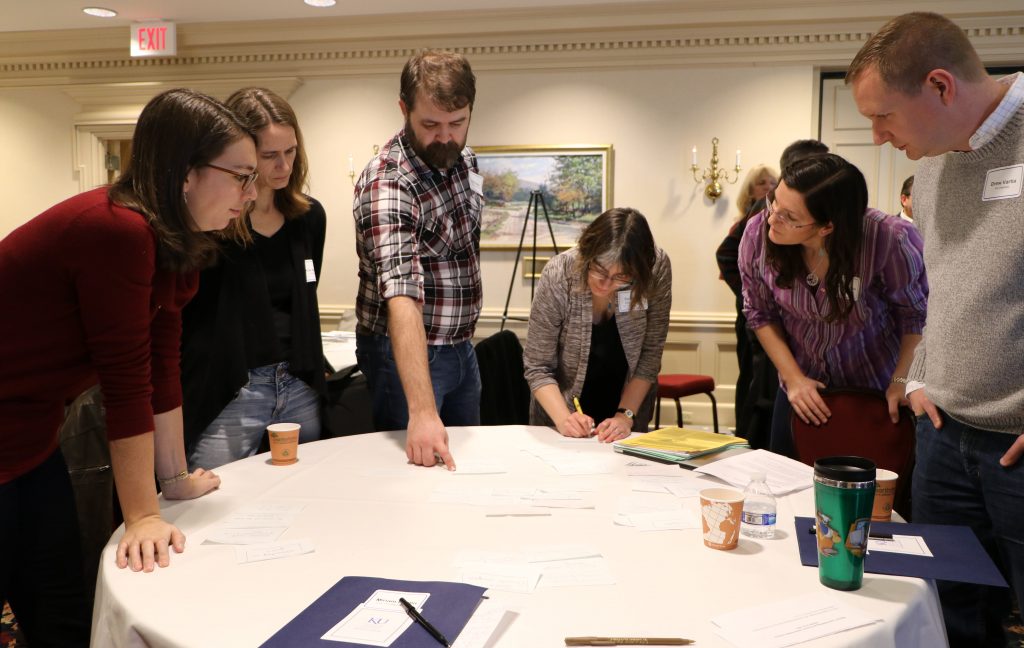By Doug Ward
The University of Kansas has gained international attention with its work in student-centered learning over the past five years.
Grants from the National Science Foundation, the Teagle Foundation, and the Association of American Universities have helped transform dozens of classes and helped faculty better understand students and learning. Participation in the Bay View Alliance, a North American consortium of research universities, has helped the university bolster its efforts to improve teaching and learning. And participation in organizations like the International Society for the Scholarship of Teaching and Learning, the Association of American Colleges and Universities, and the AAU has provided opportunities for KU faculty to share the rich work they have done in improving their courses.

KU’s leadership in student-centered education will be on display at home this week as instructors and administrators from a dozen research universities and educational organizations gather in Lawrence for a three-day institute on teaching and learning. The institute, which begins Thursday, is part of the annual meeting of TRESTLE, a network of faculty and academic leaders who are working with colleagues in their departments to improve teaching in science, technology, engineering and mathematics classes at research universities. TRESTLE is an acronym for transforming education, stimulating teaching and learning excellence.
Attendees will participate in workshops on many facets of course transformation and active learning organized around a theme of sustaining change and broadening participation in student-centered education. Among the speakers are Howard Gobstein, executive vice president of the Association of Public and Land Grant Universities; Pat Hutchings, a senior scholar at the National Institute for Learning Outcomes Assessment; and Mary Huber, a senior scholar at the Bay View Alliance, an international organization working to build leadership for educational change.
“KU has been a hub for transforming teaching and learning for several years,” said Andrea Greenhoot, director of the Center for Teaching Excellence and leader of the TRESTLE network. “TRESTLE has allowed us to expand that community beyond campus and connect with faculty at other universities.”

That collaborative approach has been central to the TRESTLE network and to this week’s institute.
“Teaching is often seen as a solitary activity,” Greenhoot said. “It doesn’t have to be that way. Our philosophy at CTE has always been that great teaching requires community. The TRESTLE community provides role models, engages faculty in intellectual discussions about teaching, gives instructors opportunities to reflect on their work, and creates a platform for sharing ideas and results.”
TRESTLE was formed three years ago after Greenhoot, Caroline Bennett, associate professor of engineering, Mark Mort, associate professor of biology, and partners at six other universities received grants totaling $2.5 million from the National Science Foundation. Their work has focused on supporting the development of STEM education experts who work within academic departments. These experts collaborate with other instructors in their departments to incorporate teaching innovations that shift the emphasis away from lecture and engage students in collaborative activities, discussion, problem-solving and projects that lead to better learning. Over the last three years, faculty members involved with TRESTLE have transformed more than 100 courses.
The transformation efforts have been impressive, Greenhoot said, but maintaining the changes after the grant ends in two years will be crucial. Blair Schneider, the program director of TRESTLE, has been coordinating this week’s activities with that in mind.
“We will be asking participants to take on some challenging questions during their time in Lawrence,” Schneider said. “How can we sustain the momentum we’ve built up over the last three years? What will it take to keep departments focused on improving student learning? How do we keep all this going? Everyone involved with TRESTLE has been energized as they have shared ideas and rethought their classes. We want to make sure that energy continues.”
As part of the institute, several KU faculty members are opening their classrooms so that participants can see the results of course transformation. Those instructors are from geology, chemistry, biology, civil engineering, and electrical engineering and computer science. Participants will also have opportunities to see active learning classrooms that KU has created over the past few years.
Open textbook workshop
If you haven’t looked into using open resources in your classes, you should. Open access materials replace costly textbooks, saving students millions of dollars a year even as they provide flexibility for instructors.
Two workshops at KU Libraries in October will help instructors learn how to adopt, adapt and even create open resources for their classes. Josh Bolick, scholarly communication librarian in the Shulenburger Office of Scholarly Communication and Copyright, will the lead the workshops as part of Open Access Week, an international event aimed at increasing awareness of open access materials.
Bolick’s workshops, “Open Textbooks and How They Support Teaching and Learning,” will be held from 9:30 to 11 a.m. on Oct. 19 and Oct. 23 in Watson Library, room 455. You can register here.
Doug Ward is the associate director of the Center for Teaching Excellence and an associate professor of journalism. You can follow him on Twitter @kuediting.

Recent Comments